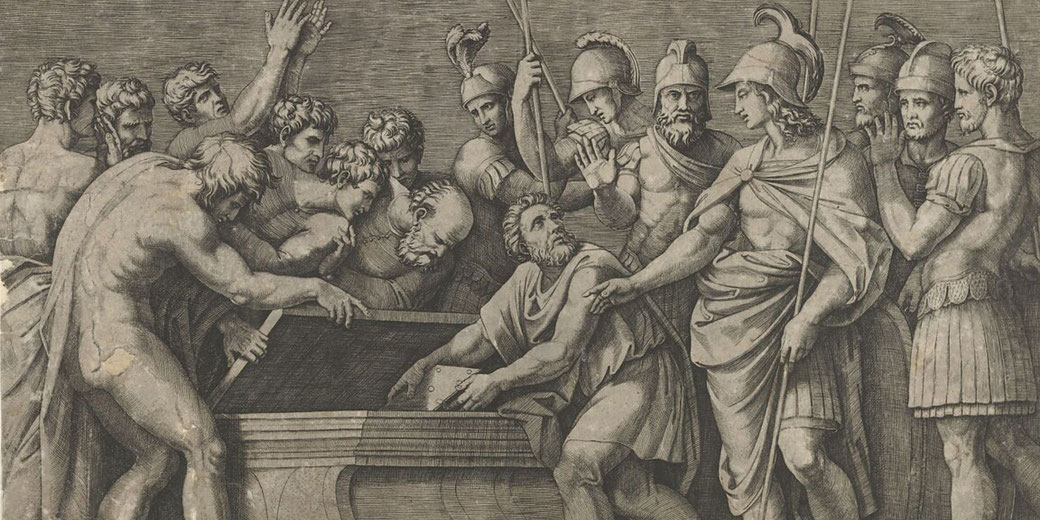What Alexander the Great did when he visited the site of the mythical Trojan War

Alexander the Great, one of history's most renowned conquerors, was not only a formidable military strategist but also a devoted admirer of Greek mythology and the Homeric epics.
His deep-seated fascination with the legendary city of Troy and its heroes, particularly Achilles, led him to embark on a remarkable journey to the ancient site during his eastern conquests.
Why was Troy so important to Alexander?
Troy, also known as Ilion, holds a special place in Greek mythology, as it was the central setting for the epic tale of the Trojan War.
This war was immortalized in Homer's Iliad, an epic poem that recounts the final weeks of the conflict between the Greeks and the Trojans.
The Iliad is not only a captivating narrative of war and heroism but also an exploration of human emotions, values, and the complex relationships between mortals and gods.
In ancient Greece, the Iliad was revered as a cornerstone of literature and education, and its stories and characters were embedded in the cultural fabric of the society.
The city of Troy, therefore, represented a connection to the glorious past and the heroic deeds of the great warriors who fought for honor, love, and their homeland.
His obsession with Achilles
Alexander the Great was deeply influenced by the Iliad and its protagonist, the Greek hero Achilles.
From a young age, Alexander was taught the Homeric epics by his tutor, the philosopher Aristotle.
The tales of valor, loyalty, and determination resonated with the young prince, who saw in Achilles a model of the ideal warrior and leader.
Alexander's fascination with Achilles went beyond mere admiration; he strove to emulate his hero in his own conquests, seeking to surpass Achilles' accomplishments and etch his own name into the annals of history.
Alexander's Journey to Troy
Alexander the Great visited the site of Ancient Troy in 334 BC during his eastern conquests, specifically as he embarked on his campaign against the Persian Empire.
The visit to Troy held both personal and strategic significance for Alexander. On one hand, it fulfilled his long-held desire to pay tribute to his hero Achilles and connect with the glorious past of Greek mythology.
On the other hand, the visit served as a powerful symbolic gesture that showcased his intention to unite the Greek world under his rule and carry on the legacy of the legendary heroes.
Alexander's journey to Troy began after crossing the Hellespont, a narrow strait separating Europe and Asia, which marked the beginning of his invasion of the Persian Empire.
Upon arriving in the region of the ancient city, he and his army followed the coast of the Troad, a historic area in modern-day Turkey that encompassed the ancient city of Troy.
Ceremony at the Tomb of Achilles
Upon reaching the Tomb of Achilles, Alexander took a moment to pay his respects and acknowledge the greatness of the legendary warrior.
He is said to have declared, "O fortunate youth, to have found Homer as the herald of your glory!" This statement highlights Alexander's appreciation for the enduring legacy of Achilles, immortalized through the words of the great poet Homer.
Then, Alexander poured oil over the tomb, a customary practice in ancient Greek funerary rituals symbolizing purification and sanctification.
He also placed garlands of flowers and foliage on the tomb, signifying honor and respect for the deceased.
Next, Alexander and Hephaestion sacrificed animals, likely horses, to honor the spirits of Achilles and Patroclus. This ritual was meant to appease the souls of the dead and seek their favor.
Finally, Alexander is believed to have organized athletic games at the site, following the ancient Greek tradition of hosting such competitions in memory of deceased heroes.
These games would have showcased the strength, agility, and skill of the participants, celebrating the virtues associated with Achilles and other warriors.
How did the experience change Alexander?
Alexander the Great's visit to the site of Ancient Troy not only played a significant role in his personal life but also left a lasting impact on his legacy as a conqueror and a leader.
His connection to Troy and admiration for the heroes of the Iliad had profound effects on his conquests, leadership style, and the cultural fusion he initiated within his empire.
His visit to Troy served as a reminder of the values and virtues he aspired to embody as a leader, including bravery, loyalty, and a commitment to the greater good.
By paying homage to Achilles, Alexander was reinforcing his connection to the heroic past and legitimizing his claim to lead the Greek world.
Alexander's fascination with Troy and the Iliad also played a role in shaping the cultural synthesis he promoted within his empire.
As he conquered new territories, Alexander encouraged the blending of Greek and Eastern cultures, leading to the birth of the Hellenistic Age, a period characterized by the fusion of diverse traditions, beliefs, and artistic styles.
What do you need help with?
Download ready-to-use digital learning resources
Copyright © History Skills 2014-2025.
Contact via email
With the exception of links to external sites, some historical sources and extracts from specific publications, all content on this website is copyrighted by History Skills. This content may not be copied, republished or redistributed without written permission from the website creator. Please use the Contact page to obtain relevant permission.





